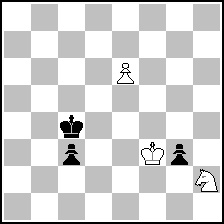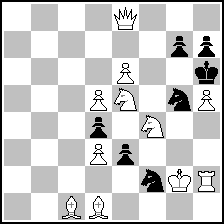
Website founded by
Milan Velimirović
in 2006
18:52 UTC


| |
MatPlus.Net  Forum Forum  General General  The worth of virtual play The worth of virtual play |
| |
|
|
|
|
You can only view this page!
| | | (1) Posted by Sarah Hornecker [Monday, May 14, 2007 09:08]; edited by Sarah Hornecker [07-05-14] | The worth of virtual play
In another topic [1] there was expressed following opinion.
QUOTE
Hauke Reddmann:
Of course, you can play a prank on "expert solvers"; I dimly remember
a problem by Ellerman with lots of "modern" content, but it all was a
chimera and the solution a stupid check.
My opinion is that rich virtual play makes up for a bad key, moreover I think his problem was like a riddle to puzzle the solvers.
So what's the opinion of experts? Is a bad key not as good if the problem has good virtual play? Shouldn't be virtual play considered almost [2] the same way as actual play?
I think this is very interesting for discussions. And if anyone knows the abovementioned problem by Ellermann, he's welcome to post it.
I'm only in studies so all I can give you is a study that works this way. Well, the author even hid the actual play!
 (= 3+3 ) (= 3+3 )
Ernest Pogosiants
(source and year unknown)
White wins
1.Sg4
That's everything given in the database of Harold van der Heijden so I had to analyse myself. It was clear from the beginning that 1. Kxg3 only draws. So the big question I had was why 1. Sf1 failed and I found "Pogo"'s intention.
1. Sf1? doesn't protect e5. 1. Sg4 Kd5 2. e7 c2 3. e8Q c1Q 4. Qd7+ wins the queen.
Now black has two better defenses:
1. ... g2 2. Kxg2 and:
2. ... Kd3 3. Se3! Kxe3 4. e7 c2 5. e8Q+ Kd2 6. Qd7+ (or 6. Qd8+) Kc3 7. Qg7+ Kb3 8. Qa1 winning
2. ... Kd5 3. e7 c2 4. e8Q c1Q 5. Qd7+ Ke4 6. Sf2+ Ke3 7. Qd3+ Kf4 8. Qf3+ (sadly 8. Qg6 also wins) Kg5 9. Se4+ Kg6 10. Qf6+ Kh7 11. Sg5+ winning.
I know this wasn't really what I asked for but I don't know a better study at the moment.
Ok, so the question again: Do you think a bad is as good if the problem has good virtual play? [3] Shouldn't be virtual play considered almost the same way as actual play?
[1] http://www.matplus.net/test2/start.php?px=1179125050&app=forum&act=posts&fid=xshow2&tid=146&pid=742#n742
[2] of course, not every line but at least the thematic ones and those with only one refutation
[3] Note: For actual play this is clear, see the first orthodox Babson as an example or Kindermann's study from Jan Timman 50 JT
| | | (2) Posted by Hauke Reddmann [Monday, May 14, 2007 11:12] |
A big "YES" to your question - you could throw away half of the
white line combination problems otherwise :-)
E.g. this one especially:
H. Reddmann, SCHWALBE 8900
 (= 11+7 ) (= 11+7 )
Case closed :-)
Hauke
| | | (3) Posted by Zalmen Kornin [Monday, May 14, 2007 14:30] |
Some themes involving virutal play are so difficult to be showed, that the composer will sometimes feel compelled to present a key that is the only possible (some examples already discussed here, for instance of Vladimirov Theme in #2 are particullarly significant)
In other instances, if the key move is more obvious than the try move(s), the composition can be a fiasco, because the content will remain obscure, outside of some restricted and specific discussion on the *hidden intentions*
A good feature will be when the try is a 'safer', or more logical option, with a subtle (or at least thematical) refutation, and the key a more secret and/or paradoxical choice
(I believe that it's comprehensible that while we discuss this, i recall something from my own experience, so an example of what is exposed above can be http://www.softdecc.com/pdb/comment1.pdb?P=P1067798&expression=PROBID%3D%27P1067798%27&start=0&langt=EN&langn=EN thanks for the attention so far :)
| | | (4) Posted by Michael McDowell [Monday, May 14, 2007 16:58] |
(1) The beauty and the message of a chess problem should be clear for all to see.
(2) It should not be necessary for its merit (real or imaginary) to be explained by the composer or chess editor.
(3) It follows that unless set-play or try-play stands out prominently, it is of little or no value.
(4) The actual play should be sufficiently pleasing to reward the solver for his trouble (unless possibly some outstanding "task" has been achieved).
The views of Comins Mansfield, who knew a thing or two about two-movers.
| |
No more posts |
MatPlus.Net  Forum Forum  General General  The worth of virtual play The worth of virtual play |
|
|
|
 ISC 2024
ISC 2024 Forum
Forum  General
General  The worth of virtual play
The worth of virtual play 


